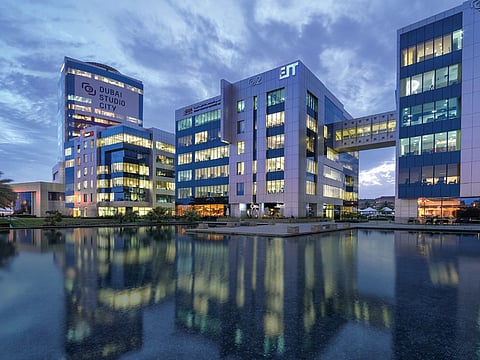Dubai’s Studio City has the lights on the action
Aims to make full use of Saudi Arabia opening up its entertainment industry, Al Suwaidi says

Dubai: Dubai Studio City (DSC) expects demand for its production services to jump following the opening up of Saudi Arabia’s entertainment industry.
Majed Al Suwaidi, managing director of Dubai Media City, Dubai Studio City and Dubai Production City, told Gulf News that Dubai has the infrastructure and state-of-the-art technologies needed to meet the growing demand for digital content in the region.
”Since 2005, we focused more on creating the environment,” he said. “Dubai Studio city was created with the Dubai concept — that is develop and create the industry. So, we developed the infrastructure to create the industry and attain growth. The growth will [be measured] in the number of productions that have been happening.”
He sees DSC benefiting from Saudi Arabia’s opening up its entertainment industry and said more production houses are expected to use the facilities, especially compared to 10 years ago.
We said there are production houses around the world, but Dubai will be able to establish a local industry, much in the same way that Dubai was able to distinguish itself in the tourism industry.
“We have the infrastructure and the services such as backlots, sound stages, water tanks, production offices, recording studios and offices to cater to the broadcasting, film production, TV, music, and entertainment sectors,” he said. Dubai Studio City has seven sound stages and three of those are the largest in the region.
Competition in the region is growing, with production companies already established in Kuwait, Bahrain, Saudi Arabia, Syria, Lebanon, Turkey, Morocco and Jordan. According to Arab Media Outlook (2016-18), almost half of the TV series (47 per cent) are still produced in Egypt despite competition from centres in the Gulf.
“It is different to compare the growth as the number of companies created is not the same as in other sectors,” he said. “Production is not a lightweight category. It needs infrastructure, equipment, cost, development, soundstages, etc. The UAE was not known for big production houses compared to Kuwait and Lebanon.”
Attractive place
A lot of movies have been made in Dubai without using DSC facilities, but large scale productions such as Star Trek Beyond, Master Chef Arabia, and The Cube have used the soundstages at DSC.
About 80 TV films and dramas have been made at Studio City so far.
“Our focus is not only on Hollywood and Bollywood movies. We are open to all and large-scale production houses and they find Dubai as an attractive place and we can supply them with what they need.
“When we reach a certain capacity, then we will think of expansion. Expansion is not an issue for us as the land is available.“
“We will change as we need,” he said. “We are very agile. It will only grow but we need to create the environment. We have people for content creation and places for content creation. We want DSC to be focal point for content creation,” he said.
He said that YouTube’s decision to open a 6,000-square-feet office space in Dubai Studio City, part of an effort to give a boost to content creators in the Middle East and North Africa (Mena), will boost Dubai’s profile for content creation.
“Hopefully, we can see more of content creation and with the opening of YouTube space, there is a huge growth opportunities for digital content. Today, content creation is becoming a big industry,” Al Suwaidi said.
He said YouTube choose Dubai because the company recognised the potential for growth in the region. He said that anyone can be a content creator now because the equipment has become cheaper.
Now, you need only a good smartphone to create content and it is now easy to share content because of high bandwidth and mobile penetration rates,” he said. “Just imagine what will happen if the internet starts growing in double-digits.”
Sign up for the Daily Briefing
Get the latest news and updates straight to your inbox



